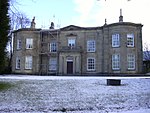Bacup railway station
1852 establishments in EnglandBeeching closures in EnglandDisused railway stations in the Borough of RossendaleFormer Lancashire and Yorkshire Railway stationsNorth West England railway station stubs ... and 4 more
Pages with no open date in Infobox stationRailway stations in Great Britain closed in 1966Railway stations in Great Britain opened in 1852Use British English from May 2017

Bacup railway station served the town of Bacup, Rossendale, Lancashire, England, from 1852 until closure in 1966 and was the terminus of two lines; one from Rawtenstall and the other from Rochdale.
Excerpt from the Wikipedia article Bacup railway station (License: CC BY-SA 3.0, Authors, Images).Bacup railway station
Manor Street, Borough of Rossendale Rockliffe
Geographical coordinates (GPS) Address Nearby Places Show on map
Geographical coordinates (GPS)
| Latitude | Longitude |
|---|---|
| N 53.6978 ° | E -2.20104 ° |
Address
Manor Street
Manor Street
OL13 0DS Borough of Rossendale, Rockliffe
England, United Kingdom
Open on Google Maps









